Security Lab’s Tamara Denning hosts Cory Doctorow for a Q&A visit
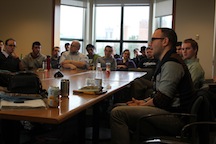 UW CSE Security Lab member Tamara Denning hosts science fiction author, activist, journalist and blogger Cory Doctorow for a technically-flavored Q&A session.
UW CSE Security Lab member Tamara Denning hosts science fiction author, activist, journalist and blogger Cory Doctorow for a technically-flavored Q&A session.
Paul G. Allen School of Computer Science & Engineering, University of Washington
 UW CSE Security Lab member Tamara Denning hosts science fiction author, activist, journalist and blogger Cory Doctorow for a technically-flavored Q&A session.
UW CSE Security Lab member Tamara Denning hosts science fiction author, activist, journalist and blogger Cory Doctorow for a technically-flavored Q&A session.
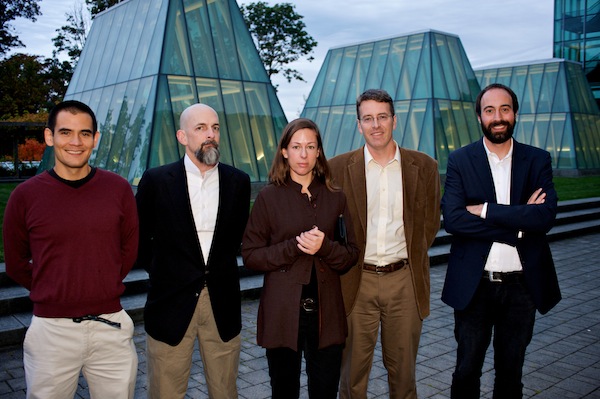 UW CSE Security Lab’s Yoshi Kohno joins author Neal Stephenson, Bethan Cantrell, and Greg Lastowka at the UW School of Law for a discussion of Stephenson’s latest book, REAMDE. The discussion was moderated by Ryan Calo. Watch a video of the discussion here.
UW CSE Security Lab’s Yoshi Kohno joins author Neal Stephenson, Bethan Cantrell, and Greg Lastowka at the UW School of Law for a discussion of Stephenson’s latest book, REAMDE. The discussion was moderated by Ryan Calo. Watch a video of the discussion here.
David Pogue’s PBS NOVA Science NOW featured the work of UW CSE Security and Privacy Research Lab as the final segment of the episode “Can Science Stop Crime?”
Those featured include UW CSE faculty member Yoshi Kohno, UW CSE Ph.D. alum Dan Halperin, and UW CSE Ph.D. students Karl Koscher, Franzi Roesner, Alexei “Crash” Czeskis – and the work of these and others.
Watch this 12-minute PBS NOVA Science NOW segment!
Watch Can Science Stop Crime? on PBS. See more from NOVA scienceNOW.
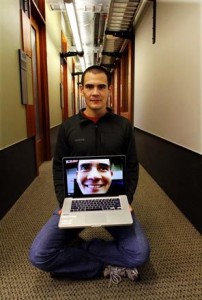 The Seattle Times describes this Wednesday’s PBS TV NOVA scienceNOW:
The Seattle Times describes this Wednesday’s PBS TV NOVA scienceNOW:
“For most people, computer security means just that: Keeping viruses off your desktop or laptop, your PC or your Mac.
“But when Tadayoshi Kohno thinks of computers and security, he thinks about the vulnerabilities inherent in a whole range of devices that are increasingly connected wirelessly to the Internet, to cellphones or to each other.
“A computer scientist at the University of Washington, Kohno has proved that you can hack and take over the circuitry of a pacemaker, an implantable defibrillator, a child’s toy, a mileage-tracking device for runners, and — perhaps most chilling of all — a car.
“Kohno, 34, is so good at what he does that government regulators and manufacturers habitually beat a path to his door, in the UW’s computer science and engineering department, where he is an associate professor.
“Kohno will be featured Wednesday on PBS’s NOVA scienceNOW, in an episode that examines whether science can help solve crime.”
Read more here. Watch NOVA scienceNOW on PBS TV on Wednesday (in Seattle, 10 p.m. on KCTS-9)!
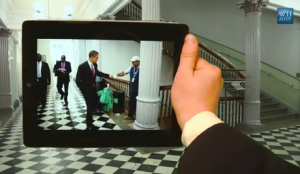 Alexei Czeskis, a Ph.D. student in UW CSE’s Security and Privacy Research Lab, is interviewed by The Voice of Russia – American Edition.
Alexei Czeskis, a Ph.D. student in UW CSE’s Security and Privacy Research Lab, is interviewed by The Voice of Russia – American Edition.
“After news surfaced over the weekend that a U.S. government computer network was breached by hackers, computer security experts have weighed on the situation, calling it ‘a game between defenders and attackers.’ …
“Host Jessica Jordan spoke with Alexei Czeskis, a Ph.D. candidate in the Security and Privacy Research Lab at the University of Washington, to learn more about the hacking and computer security.”
Listen to the interview here.
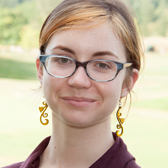 UW CSE Ph.D. student Tamara Denning, who works with professor Yoshi Kohno in UW’s Security and Privacy Research Lab, has been named on of 18 recipients of 2012 Intel Ph.D. Fellowships. Tamara was one of 3 of the 18 to win special recognition of her research at a technical poster session for all of the awardees.
UW CSE Ph.D. student Tamara Denning, who works with professor Yoshi Kohno in UW’s Security and Privacy Research Lab, has been named on of 18 recipients of 2012 Intel Ph.D. Fellowships. Tamara was one of 3 of the 18 to win special recognition of her research at a technical poster session for all of the awardees.
Meet Tamara and the other 2012 Intel Ph.D. Fellowship winners here. Learn about Tamara’s work here.
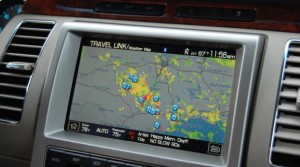 American Public Media writes:
American Public Media writes:
“Any computer hooked up to the Internet is a potential victim of malicious hackers.
“Of course, it’s one thing to be hacked on a desktop PC, it’s quite another to be hacked in your car, traveling at 70 miles an hour, with a computer that controls your brakes and steering.
“Yoshi Kohno is part of a research team studying car computer security at the University of Washington. He says don’t freak out. Yet. ‘Right now, my grad students are the only people who are likely to hack your car.’”
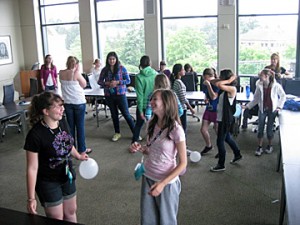 On Friday June 29, a group of middle school girls spent the morning in UW CSE, followed by an afternoon visit to Amazon.com. In UW CSE, the students were hosted by Crystal Eney, Caitlin Harding, and Victoria Wagner, and participated in activities including “Computer Science Unplugged” (Allison Obourn), sustainability sensing (Eric Larson), and computer security (Karl Koscher).
On Friday June 29, a group of middle school girls spent the morning in UW CSE, followed by an afternoon visit to Amazon.com. In UW CSE, the students were hosted by Crystal Eney, Caitlin Harding, and Victoria Wagner, and participated in activities including “Computer Science Unplugged” (Allison Obourn), sustainability sensing (Eric Larson), and computer security (Karl Koscher).
The girls were participating in G2CS – Girls Gather for Computer Science – a 4-week summer program.
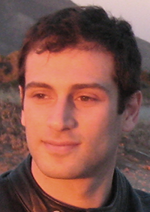 UW CSE Ph.D. student Alexei Czeskis was interviewed on American Public Media’s “Marketplace” concerning a program in San Antonio to track students within their high schools using RFID.
UW CSE Ph.D. student Alexei Czeskis was interviewed on American Public Media’s “Marketplace” concerning a program in San Antonio to track students within their high schools using RFID.
“Alexei Czeskis studies RFID privacy issues at the University of Washington’s Security and Privacy Research Lab. He says it’s hard to predict the consequences of collecting all this data on our children.
“‘We don’t know what it could be used for in the future,’ he says, ‘and that could be something good or it could be something really bad. For example, maybe it’s foreseeable that when these students apply to college for admission, colleges might be able to request this type of data. Those kinds of things could have implications for students further on in their lives.’”
Listen to the story here.

TNW reports:
“Earlier in the week we reported on the pretty epic interactive Google doodle that was an homage to Dr Robert Moog. The super cool landing page allowed visitors to mess around with a virtual Moog synthesizer and then share their noisy creation with others as an application recorded and played back the sounds (On a virtual reel-to-reel no less!)
“One smart engineer is all it takes to push a project further of course. Karl Koscher is a Ph.D. student studying computer security at the University of Washington, and he told TNW …”
Read the post and try it out here.